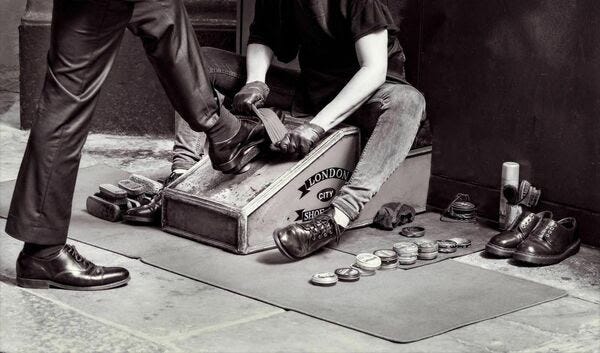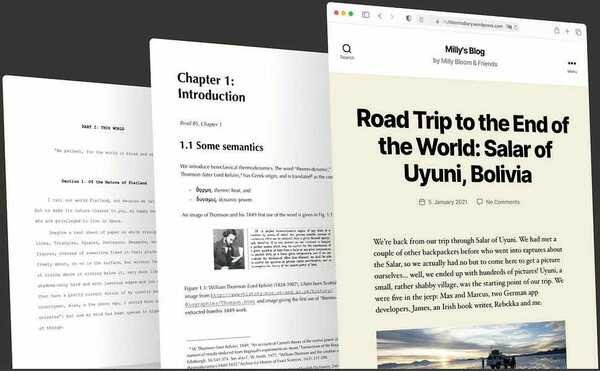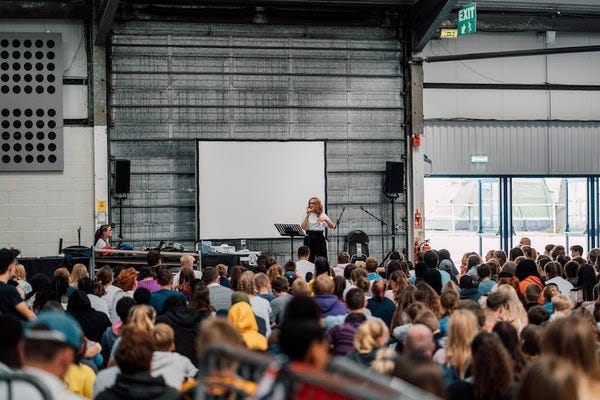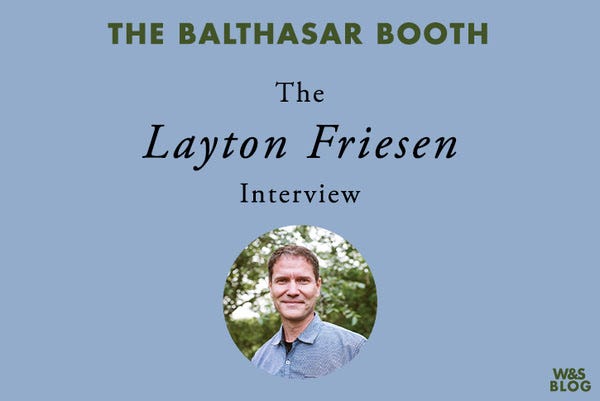The Lectio Letter - Issue #54 - Becoming a People of Forgiveness | Part II
“It’s no wonder that this culture quickly becomes littered with enormous numbers of broken and now irreparable relationships. Politics itself becomes a new kind of religion, one without any means of acquiring redemption or forgiveness.”
― Tim Keller
“Resentment is like drinking poison and then hoping it will kill your enemies.”
― Nelson Mandela
“Forgiveness is not an occasional act, it is a constant attitude.”
― Martin Luther King Jr.
“Forgiveness is an act of the will, and the will can function regardless of the temperature of the heart.”
― Corrie Ten Boom
“Always forgive your enemies; nothing annoys them so much.”
― Oscar Wilde
Welcome to Issue #54 of the Lectio Letter. This members-only newsletter is filled with music, film and food suggestions, links, and an article written by yours truly.
Here is the second in a four-part series on “Becoming a People of Forgiveness”. While forgiveness sits as a central concept in Christianity, the practical task of living out forgiveness can be the most difficult.
This second part reflects on the knotty realities of our desire for justice, the need for judgement and the goal of reconciliation. Each of these realities admittedly deserves its own four-part series. Forgiveness seems like it should be Christianity 101, but when we get into the trenches of practical forgiveness we find ourselves tossed to and fro by our emotions and desires for justice.
As I said in the introductory comments in Part 1, there is so much ground to cover when reflecting on the complexities of forgiveness made practical. I realise once I had written all the parts that I’d only mapped 20% of the terrain that I had hoped to unpack but I hope what is here is helpful nonetheless.
Sharing is Caring
If you enjoy this issue, please feel free to forward on along with an encouragement to become a supporting member.
I’m very grateful to those of you who have done that in the past.
Status Board
Life
The tension of life between the time of Christ’s resurrection and his return has been called the “Now and the Not Yet”. A time when Christ’s Kingdom has broken into the present with power through His Spirit and people and yet has not yet fully come.
These last few months have brought into our attention circumstances and situations that have reminded us, painfully at times, that the world and life is not all that God intended it to be.
Challenging relationships, broken systems, unmet hopes and pain in the lives of people we deeply care about.
While we wade through these challenges we are still reminded that our lives, the deepest parts of who we are, are ‘hidden’ in Christ. Safe and bound to Jesus Himself and His unstoppable future that will one day burst into the present.
Of course, this is a but of a vague gesture towards the realities of our day to day life, but this is my reflection for today.
What is today is not all that will be, we are people who set our eyes on the future hope of Christ’s fullness that shines in through the cracks of our broken present convincing us that as the writer to the Corinthian church says “No eye has seen, no ear has heard and no mind has imagine what God has prepared for those who love Him” 1 Cor 2:9.
Far from wishful thinking, this is hope rooted not in circumstance but in the steady drumbeat of the people of God over the past 2000 years who have set their hearts on “things above” in order to live on earth as it is in heaven.
Music
The other evening we watched “Sing Street”, which was an adorable romantic comedy with a great 80’s music soundtrack (Motorhead, Duran Duran, The Cure and some great original music too).. I’ve been listening to the soundtrack here..
Sing Street (Original Motion Picture Soundtrack) - Compilation by Various Artists | Spotify
Listen to Sing Street (Original Motion Picture Soundtrack) on Spotify. Various Artists · Compilation · 2016 · 17 songs.
It also took me down a bit of a rabbit whole revisiting The Cure… another good track here!
The Cure - Boys Don't Cry
Watching
As I mentioned above, Sing Street is a movie set in Dublin in the 80’s and has a great soundtrack. It impressively manages to be a romantic musical with plenty of comedy while touching on some pretty serious themes. Well Worth a watch!
Sing Street Official Trailer #1 (2016) - Aidan Gillen, Maria Doyle Kennedy Movie HD
Reading
I’m continuing to work through Andrew Root’s A Congregation in a Secular Age. In the last section of the book, he continues to talk about the nature of time and the modern age.
Modernity he argues, through the German sociologist Hermit Rosa, is built on acceleration. We have an inbuilt sense that something is better if it is Faster, newer, and bigger.
This carries into the institutions of society including church and politics. Political terms are far less about governing than they are pitching novel solutions for the purpose of re-election.
Churches similarly cannot plod through their “long obedience in the same direction”. They must always innovate, grow and change. While some change is inevitable, change and innovation become the only way to survive in a marketplace ethic that has infected church life.
While there is much that could be said about the effects of that motivation, the recent spectacle of the gratitude and grief offered in response to the Queen’s death might reveal something significant here. One of the most repeated reflections on the Queen’s death was the gratitude for her consistency and longevity.
She reigned for the majority of many people’s lives, and in the acceleration of time that occurs in modernity, she created a consistency that provided a constant in a world that sorely needs one.
When a society moves at an increasing speed there comes with it an increased anxiety. An Anxiety that Alan Ehrenberg describes in French as “L'fatigue d'etre moi”, the fatigue of being me. With demand for life and society to consistent speed up, it’s worth asking, at what speed does life become inherently inhuman?
The fatigue of living at such speed is only slowed down sufficiently when society as a whole gives permission, for example during the COVID lockdowns and times of national mourning.
These are glimpses into the human need to rest, reflect and recover in an increasingly sped-up and inhuman society built on greed, speed and productivity. Root’s question in this book is whether that speed is damaging the soul of the Church and her people.
Becoming a People of Forgiveness | Part II | Forgiveness, Judgement, Justice and Repentance
In the previous part of this series, I reflected on the significance of Jesus’ life as an example of forgiveness. Jesus doesn’t simply charge the difficult things of life to some divine credit card but navigates his entire human existence through relying on the Spirit. In that way, his human life is truly a life that we can seek to imitate, not just by pulling ourselves up in heroic self-reliance and strength, but by admitting our lack and our weakness, and throwing ourselves reliantly on God and his empowering Spirit.
We need the power of the Spirit to do what we cannot do in our own strength. This is particularly true when we need to forgive others. We are called to be a people of forgiveness which is not only hard but basically impossible unless we are formed as people who cultivate a posture of forgiveness, who understand that we will be offended and hurt, and resolve by the power of the Spirit to be people who are truly marked by forgiveness.
I also reflected that while forgiveness, mercy and grace are big ideas embedded in the scriptures and the songs we sing, the reality is that everything seems to head south when we encounter a concrete situation where these are required. In the short term, anger, vengeance and justice stand out as the most attractive options to pursue. (Read Part I here if you missed it)
Before we jump into the practical aspects of forgiveness, we need to consider the part forgiveness plays in the story of God because forgiveness flows from the reality that we have been forgiven. Indeed, most of the appeals to forgive in the New Testament are written to quarrelling churches and tie the act of forgiving one another to the forgiveness we have been offered in Jesus.
Sometimes we simplify the gospel to sound something like this: we are guilty, Jesus came to set us free from that guilt before God, and now we are no longer guilty. While these statements are true, they are certainly not the whole picture. Forgiveness does mean that we are no longer held responsible for our sin, but sin was not the very beginning of the story, and the removal of sin and guilt is not the end.
When we oversimplify the story, we end up with a transactional gospel. The transaction clears our debts and Jesus is the mechanism through which that debt is cleared. In this telling of the gospel, we only need Jesus as a mechanism, and this becomes a form of Christianity where Jesus is here to help us get what we want or need, and when he no longer fulfils our wants, he is discarded like a piece of outdated technology.
Although it includes debt, sin and guilt, the full scope of the Biblical story calls us into a deeper reality. This reality is the significance of God’s presence. Sin and guilt are the brokenness that prevents us from seeing and experiencing God clearly, and their removal makes way for God’s presence to dwell fully with humans in the way God always intended. Forgiveness removes the obstacles to presence, but the goal is reconciliation. The heart of the act of forgiveness is that presence and relationship can be restored. Forgiveness is what is required to restore a relationship but reconciliation is the fulfilment of forgiveness. If forgiveness is the root of the solution to our problem, then reconciliation is the fruit of the root of a forgiven life.
You may be wondering where repentance is in all of this? If forgiveness is for the sake of reconciliation, what part does repentance play? Most of us came to the saving knowledge of the Gospel by recognising that we have done wrong and have fallen short/missed the mark of what God intends. Following that awareness, we receive God’s forgiveness and enter into an actively reconciled relationship with him.
This is where we begin to pick up one practical implication for the forgiveness we are called to live out. When we have an opportunity to forgive someone, surely they should repent before that forgiveness is offered and a reconciled relationship can begin? Ideally, we might expect someone to repent before they are offered forgiveness.
But we see in Jesus’ life an offering of forgiveness before there is any repentance.
In Romans 5:8, Paul tells us that “God has demonstrated his own love for us in this; while we were still in our sin, Christ died for us.” Forgiveness is offered to an unrepentant people so that, as it says in Romans 2:4, God’s kindness leads us to repentance. Jesus’ whole life has prepared him to become the type of person who knows how to offer forgiveness, even before others recognise and repent of their sin.
Sometimes, those who sin against us see what they have done and repent, but more often than not, even if some blame is accepted, it is often not fully acknowledged or owned. But in Jesus’ life, we see an invitation to be ready to forgive, even if there has been no acknowledgement of any wrongdoing.
It is easy to resist forgiving someone who doesn’t acknowledge any wrongdoing because we feel somewhat entitled to justice, and to forgive would be to shortcut that. It grates with us. But when we forgive, it is not just about releasing our right to justice. It is also about judgement. It is a judgement that something has happened which was not supposed to happen, and it requires forgiveness. Therefore, even if the person who needs our forgiveness cannot express exactly what they need to be forgiven for, the offer itself, far from being a shortcut of justice, stands as a form of rebuke.
It is a rebuke but with a gift embedded within it. The gift is of forgiveness with the hope for reconciliation. It is this that allows forgiveness not just to be an easy peacemaking act or a kind of “sweeping something under the rug.” In forgiveness, we clearly name what has gone wrong and call it for what it is, something that requires forgiveness in order to restore the relationship.
When God becomes human in Jesus and lives a life culminating on the cross, he is engaging in an act of forgiveness in expectation of later repentance, not as a response to it. When we consider this and its implications in our own lives and broken relationships that require forgiveness it is, as someone once said to Jesus, "…a hard teaching. Who can accept it?”
Embedded in the word forgive, is the word give. I mentioned in the first part of the series that this helps us realise that when we forgive we are not engaging in a transactional exchange, but we are giving a gift. We effectively forgo the desire for justice and offer instead the gift of forgiveness.
We give a gift because we have received one.
God does not offer us transactional forgiveness, so there is no blueprint that says we should offer others transactional forgiveness. Rather, we have received in forgiveness the gracious gift of the Holy Spirit and this enables and empowers us to be able to forgo the desire for justice and offer the gift of forgiveness when we are hurt or offended. I understand that what I am saying here is not easy. It often feels nearly impossible, and this is why the act of forgiveness cannot simply be a human act of moral heroism. It is an impossible act made possible only by the power of the Holy Spirit.
By now, I’m sure some of you may be thinking of a number of scenarios in which the reflections I’ve offered are woefully shallow. While I believe that what I’ve said above is solid theology grounding all Christian acts of forgiveness, I’ll admit the process of forgiveness does not look the same for a situation when someone cuts me off in traffic versus forgiving a person who has murdered or harmed someone I love.
In the next part of this series, I will offer a further practical step in helping us identify what we need to keep in mind when we navigate, or help others navigate, the process of forgiveness.
Miscellaneous Link List
Crypto Dev Enters Wrong Command, Destroys Entire Company
A programming error accidentally — and permanently — shut down the entire Solana blockchain-based platform OptiFi, wiping out $661,000 worth of USDC.
Staff at decentralized finance platform OptiFi must be having a really bad day.
Why? The company says a coding error accidentally — and permanently — shut the entire Solana blockchain-based platform down, wiping out $661,000 worth of a stablecoin called USDC.
A series of studies found that exposure to dogs leads people to make riskier financial decisions, while interactions with cats have the opposite effect.
Dog owners tend to take bigger risks and respond more to reward-oriented advertisements. Cat owners, on the other hand, are more cautious and more likely to react to ads emphasizing risk aversion. Those are the two main findings from new peer-reviewed research I co-authored.
The proximity hack | Seth's Blog
Seth Godin’s Blog on marketing, tribes and respect
“The proximity hack
We evolved to care about things that were close by or in the near future.
That makes sense. It’s a useful survival skill in a primitive world.
Today, though, our instinct for the close and the imminent is being used against us. Media and those in search of our money or attention bring the far nearby, amplify the reality of threats and emphasize sunk costs in pushing us to stay stuck.
We need to get much better at investing in the future, and being distracted by loud, sudden noises isn’t helpful.”
13 winning images from the Washington Post's 2022 Travel photo contest - The Washington Post
Culled from nearly 1,000 submissions, this year’s winners of the Travel photo contest capture a world of detail.
www.washingtonpost.com • Share
My favourite below;
While reflecting on forgiveness, I though this diagram does a good job of representing some features of healthy relationship
How do you cheat in live chess?
Cheating allegations run rampant as world’s top player loses
Through a series of vibrations and buttons in his shoes, Stanley was able to tell the engine what move his opponent played. The engine would then relay a series of vibrations back to Stanley to let him know what move he should play next. Stanley explained that his feet were ideal for accomplishing this cheat, because they are the only part of the body that has dexterity while still being obscured from view.
Try these Google Docs Tricks 🪄 - by Jeremy Caplan
11 quick tips and hidden features
wondertools.substack.com • Share
I recently happened upon Instagram account “Welcome.jpeg” which is a quirky and sometimes edgy (you’ve been warned) digital museum. Here are a few of my favourite posts…
"Trees cocooned in spider webs after flooding in Sindh, Pakistan (2010)"
“Trees cocooned in spider webs after flooding in Sindh, Pakistan (2010) An unexpected side-effect of the floods in parts of Pakistan has been that millions of spiders climbed up into the trees to escape the rising flood waters. Because of the scale of the flooding and the fact that the water had taken so long to recede, many trees had become cocooned in spiders webs. During this time, it was reported that there were significantly less mosquitos as they were getting caught in the spider webs.”.
welcome shared a post on Instagram: “How rock climbers sleep”. Follow their account to see 3984 posts.
“The Hyena and Other Men” photo series by Pieter Hugo (2005-2007)
“So many myths surround the “Hyena Men” who haunt the peripheries of Nigeria’s cities. Nigerian newspapers told him that these men were bank robbers, bodyguards, drug dealers, debt collectors. It turned out that they were a group of itinerant minstrels, performers who used the animals to entertain crowds and sell traditional medicines. Pieter Hugo’s extraordinary portraits of their liminal existence then reveal an uncanny world of complex, codependent relationships – sometimes doting and affectionate, sometimes brutal and cruel. When looking back at the notebooks he had kept while with them, the words ‘dominance’, ‘codependence’ and ‘submission’ kept appearing. These pictures depict much more than an exotic group of travelling performers in West Africa. The motifs that linger are the fraught relationships we have with ourselves, with animals and with nature.” One fascinating thing is that the Hyena Men are all related. What they do is a tradition that is handed down from generation to generation. Young children are usually trained to tame the hyenas from birth and are encouraged to feed the animals to expel their fears. The hyena boys must also be tamed, fed strange medicines from infancy, and piled with snakes to be integrated into the community fueled by the belief that they are spiritually connected to the animals.“.
Lessons From a Week Teaching Teenagers About Sex | Blog | Think Theology
Last week, I had the amazing privilege of being at Newday and heading up a team running a seminar stream called ‘Sex Questions’. Our aim across five sessions was to help young people to ask, discuss and wrestle with some of the big questions we all have about sex and relationships. We talked about sex (‘Why does God care?’), sexuality (‘Does God love gay people?’), porn (‘What’s the harm?’), and dating (‘How do I do it right?’).
Hans Urs Von Balthasar Series
This final link a little theology-nerdy, but Book publishers Wipf and Stock are doing a series with scholars who have studied Swiss Catholic theologian Hans Urs Von Balthasar.
I particularly enjoyed this interview…
Balthasar and Barth were great friends for much of their lives. They both lived in Basel. Apparently they would vacation together or get together to play piano and listen to Mozart. They both loved Mozart. We know that Balthasar read a whole lot of Barth. He was a great fan of Barth’s writing and whenever Barth would put out another publication or another volume of his Church Dogmatics, Balthasar would snatch that up and would be reading that.
Ethics and the Acts of God: Layton Friesen on Hans Urs von Balthasar - Wipf and Stock Publishers
Scholar, pastor, and academic dean, Layton Friesen, was generous enough to sit down with Wipf and Stock’s Zech Mickel to discuss Balthasar’s theological
That’s all for now…
Liam























